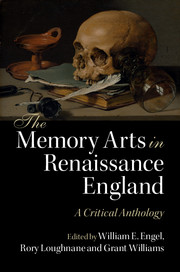Book contents
- Frontmatter
- Dedication
- Contents
- List of figures
- Acknowledgements
- A note on abbreviations
- Introduction
- PART I The art of memory
- PART II Rhetoric and poetics
- Introduction to Part II
- II.1 Anon., Table of Cebes (1531)
- II.2 Thomas Wilson, The Art of Rhetoric (1553)
- II.3 George Puttenham, The Art of English Poesy (1589)
- II.4 Henry Peacham, The Garden of Eloquence (1593)
- II.5 Philip Sidney, The Defence of Poesy (1595)
- II.6 Francis Meres, Palladis tamia (1598)
- II.7 Samuel Daniel, Musophilus (1599)
- II.8 Miles Sandys, Prudence (1634)
- II.9 Ben Jonson, Timber, or, Discoveries (1641)
- II.10 Alexander Ross, Mystagogus poeticus (1648)
- PART III Education and science
- PART IV History and philosophy
- PART V Religion and devotion
- PART VI Literature
- Index
- References
II.8 - Miles Sandys, Prudence (1634)
from PART II - Rhetoric and poetics
Published online by Cambridge University Press: 05 August 2016
- Frontmatter
- Dedication
- Contents
- List of figures
- Acknowledgements
- A note on abbreviations
- Introduction
- PART I The art of memory
- PART II Rhetoric and poetics
- Introduction to Part II
- II.1 Anon., Table of Cebes (1531)
- II.2 Thomas Wilson, The Art of Rhetoric (1553)
- II.3 George Puttenham, The Art of English Poesy (1589)
- II.4 Henry Peacham, The Garden of Eloquence (1593)
- II.5 Philip Sidney, The Defence of Poesy (1595)
- II.6 Francis Meres, Palladis tamia (1598)
- II.7 Samuel Daniel, Musophilus (1599)
- II.8 Miles Sandys, Prudence (1634)
- II.9 Ben Jonson, Timber, or, Discoveries (1641)
- II.10 Alexander Ross, Mystagogus poeticus (1648)
- PART III Education and science
- PART IV History and philosophy
- PART V Religion and devotion
- PART VI Literature
- Index
- References
Summary
About the author
Miles Sandys (1601–36) attended Oxford without taking a degree, although ‘much deserving of one’ according to Anthony à Wood. He continued his studies independently and sat in Parliament for Cirencester, site of his family's estate.
About the text
Although eager to share the fruits of his learning, Sandys admits ‘divinity was too deep’ for his ‘capacity, geography too laborious, history so various, and so full fraught with uncertainties, that once begun, never at an end’ (A4v–A5r). Published in two editions in 1634, the sixth chapter treats memory as the first of three parts of prudence, followed by chapters on understanding and providence.
The arts of memory
Memory figures significantly in Sandys's examination of the Cardinal Virtues, both as regards content (as the primary and most fundamental aspect of prudence) and style (his treatment reflects a well-stocked commonplace book). Moving from one judiciously selected quotation to another, he provides an engaging survey of what various authorities both ancient and contemporary say about memory, while also taking into account oblivion and the art of forgetting.
Textual notes
Sr. Miles Sandis, Kt, Prudence (London, 1634), D3r–E6v. As Sandys frequently quotes his sources in Latin followed by a serviceable translation, the Latin has been omitted (and is marked accordingly).
Prudence
Of memory, the first part of Prudence. Chapter VI
[…] Memory is taken three manner of ways, sayeth Albertus: first, for the very faculty or power, by which we remember; secondly, for the act of remembering; thirdly, for the habit. But to my definition: […] memory is, by which the mind repeats what things were, sayeth Cicero […] memory is a force of the understanding, retaining things received, repeating things past, recollecting things let slip. According to Saint Augustine and Hugo de sancto victore […] memory is a certain imaginary representation of things past, according to the intimation of the understanding. Memory is the treasury of innumerable imaginations, sayeth Saint Augustine […]. Memory is the consort and fellow-worker of reason, because without it, reason neither can proceed to known things, nor retain the knowledge of things known […]. Wit, sayeth Bonaventure, seeketh unknown things; memory puts up things that be judged; reason judges things that be found out: what wit finds out, it brings to reason, reason to memory, memory keeps it safe-guarded.
- Type
- Chapter
- Information
- The Memory Arts in Renaissance EnglandA Critical Anthology, pp. 131 - 135Publisher: Cambridge University PressPrint publication year: 2016



